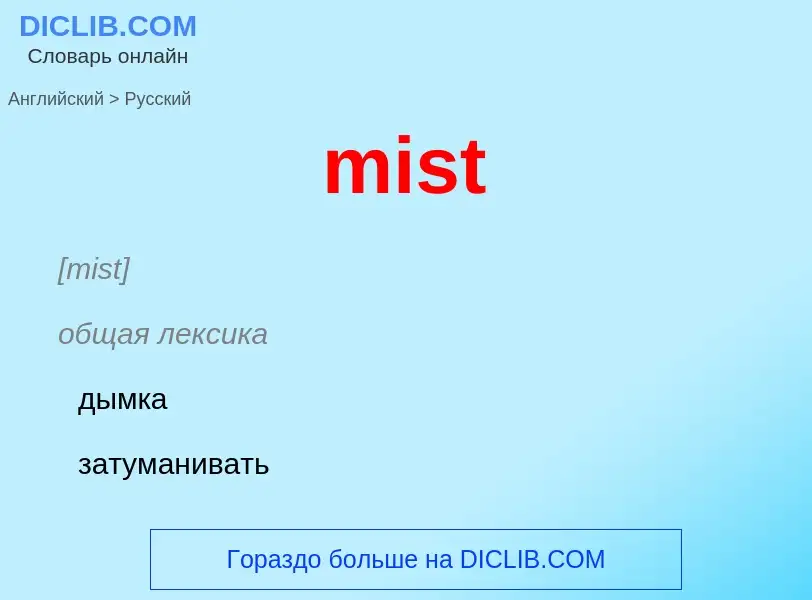Translation and analysis of words by ChatGPT artificial intelligence
On this page you can get a detailed analysis of a word or phrase, produced by the best artificial intelligence technology to date:
- how the word is used
- frequency of use
- it is used more often in oral or written speech
- word translation options
- usage examples (several phrases with translation)
- etymology
MIST - translation to English
[mist]
общая лексика
дымка
затуманивать
марь
мга
мгла
туман
ботаника
качим метельчатый
перекати-поле (Gypsophila paniculata)
нефтегазовая промышленность
нефтяная пыль
существительное
[mist]
общая лексика
(лёгкий) туман
дымка
мгла
туман
пелена перед глазами
то
что затрудняет понимание
запоминание
виски
водка и т. п. на толчёном льду с лимонной корочкой
пасмурность
туман перед глазами
глагол
общая лексика
застилать туманом
затуманивать
застилаться туманом
затуманиваться
моросить
(в безличных оборотах): it mists, it is misting - моросит
сокращение
[moving-in of standard tools] доставка на буровую стандартного оборудования
Definition
Wikipedia

Mist is a phenomenon caused by small droplets of water suspended in the cold air, usually by condensation. Physically, it is an example of a dispersion. It is most commonly seen where water vapor in warm, moist air meets sudden cooling, such as in exhaled air in the winter, or when throwing water onto the hot stove of a sauna. It can be created artificially with aerosol canisters if the humidity and temperature conditions are right. It can also occur as part of natural weather, when humid air cools rapidly, notably when the air comes into contact with surfaces that are much cooler than the air (e.g. mountains).
The formation of mist, as of other suspensions, is greatly aided by the presence of nucleation sites on which the suspended water phase can congeal. Thus even such unusual sources of nucleation as small particulates from volcanic eruptions, releases of strongly polar gases, and even the magnetospheric ions associated with polar lights can in right conditions trigger condensation and the formation of mist.
Mist is commonly confused with fog, which resembles a stratus cloud lying at ground level. These two phenomena differ, but share some commonalities; similar processes form both fog and mist. Fog is denser, more opaque, and generally lasts a longer time, while mist is thinner and more transparent.


![The [[Château de Chambord]] in France, in mist The [[Château de Chambord]] in France, in mist](https://commons.wikimedia.org/wiki/Special:FilePath/Chambord au lever du jour.jpg?width=200)
![A light morning mist on Lake Suolijärvi in [[Hervanta]], [[Tampere]], [[Finland]] A light morning mist on Lake Suolijärvi in [[Hervanta]], [[Tampere]], [[Finland]]](https://commons.wikimedia.org/wiki/Special:FilePath/Morning mist - panoramio - Henrik Heino.jpg?width=200)
![Mist near the [[Austria–Switzerland border]] in December 2006 Mist near the [[Austria–Switzerland border]] in December 2006](https://commons.wikimedia.org/wiki/Special:FilePath/Oberfallenberg 8.jpg?width=200)

![Sunlight through mist on a crisp winter morning in [[New Mexico]] Sunlight through mist on a crisp winter morning in [[New Mexico]]](https://commons.wikimedia.org/wiki/Special:FilePath/Fog in Albuquerque - AAfog3.jpg?width=200)
![Misty morning at [[Swifts Creek]] Misty morning at [[Swifts Creek]]](https://commons.wikimedia.org/wiki/Special:FilePath/Misty morning02.jpg?width=200)
![Mist on a lake in [[Alberta]], Canada Mist on a lake in [[Alberta]], Canada](https://commons.wikimedia.org/wiki/Special:FilePath/Herbert Lake beim Icefields Parkway.jpg?width=200)
![[[Labugama]], Sri Lanka [[Labugama]], Sri Lanka](https://commons.wikimedia.org/wiki/Special:FilePath/Labugama26.jpg?width=200)

